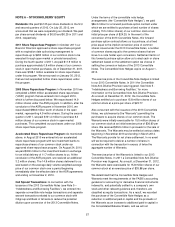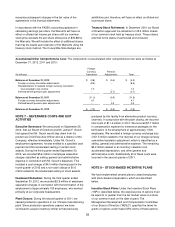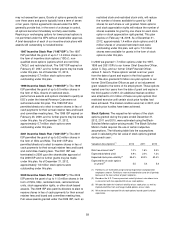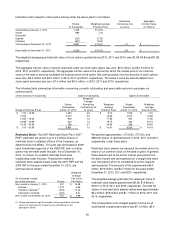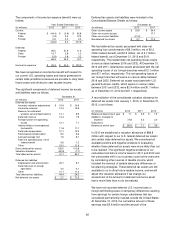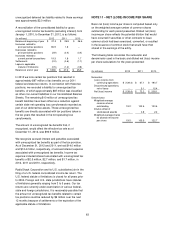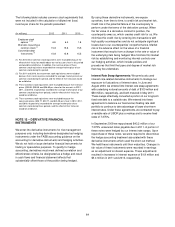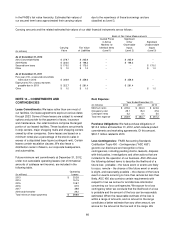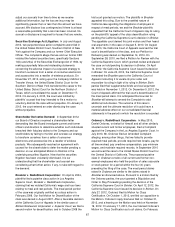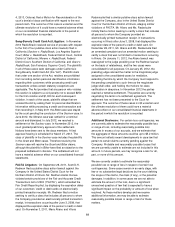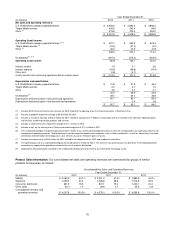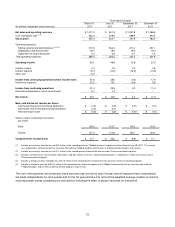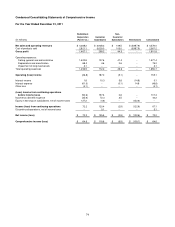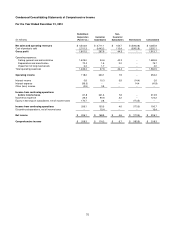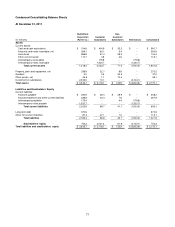Radio Shack 2012 Annual Report Download - page 69
Download and view the complete annual report
Please find page 69 of the 2012 Radio Shack annual report below. You can navigate through the pages in the report by either clicking on the pages listed below, or by using the keyword search tool below to find specific information within the annual report.
67
adjust our accruals from time to time as we receive
additional information, but the loss we incur may be
significantly greater than or less than the amount we have
accrued. We disclose loss contingencies if there is at least
a reasonable possibility that a loss has been incurred. No
accrual or disclosure is required for losses that are remote.
Securities Exchange Act Litigation: In July and August
2012, two purported class action complaints were filed in
the United States District Court, Southern District of New
York against the Company and our former Chief Executive
Officer. The complaints allege that we and our former CEO
violated the federal securities laws, specifically Sections
10(b) and 20(a) of the Securities Exchange Act of 1934, by
making purportedly false and misleading statements
concerning the adverse impact of a corporate strategy to
transform ourselves from a seller of consumer electronics
and accessories into a reseller of wireless products. On
November 27, 2012, acting upon the Company’s Motion to
Transfer Venue, the United States District Court for the
Southern District of New York transferred the cases to the
United States District Court for the Northern District of
Texas, which consolidated the cases on December 17,
2012. On January 2, 2013, the court was notified by
plaintiffs’ counsel that they intended to file a motion to
voluntary dismiss the case without prejudice. On January 3,
2013, the court entered an order dismissing the case
without prejudice.
Shareholder Derivative Demand: In September 2012,
our Board of Directors received a shareholder letter
demanding that the Board investigate current and former
officers and directors to determine whether such individuals
breached their fiduciary duties to the Company and our
stockholders by failing to monitor and oversee our strategy
to transform ourselves from a seller of consumer
electronics and accessories into a reseller of wireless
products. We subsequently reached an agreement with
counsel for the shareholder to defer the matter pending a
decision on our anticipated Motion to Dismiss in the
underlying securities litigation. Now that the securities
litigation has been voluntarily dismissed, it is our
understanding that the shareholder and counsel are
considering what further action, if any, to take with regard to
the demand.
Brookler v. RadioShack Corporation: On April 6, 2004,
plaintiffs filed a putative class action in Los Angeles
Superior Court, Brookler v. RadioShack Corporation,
claiming that we violated California's wage and hour laws
relating to meal and rest periods. The meal period portion
of the case was originally certified as a class action in
February 2006. Our first Motion for Decertification of the
class was denied in August 2007. After a favorable decision
at the California Court of Appeals in the similar case of
Brinker Restaurant Corporation v. Superior Court, we filed a
second motion for decertification, and in October 2008 the
trial court granted our motion. The plaintiffs in Brookler
appealed this ruling. Due to the unsettled nature of
California law regarding the obligations of employers in
respect of meal periods, we and the Brookler plaintiffs
requested that the California Court of Appeals stay its ruling
on the plaintiffs’ appeal of the class decertification ruling
pending the California Supreme Court’s decision in Brinker.
The appellate court denied this joint motion and then heard
oral arguments in the case on August 5, 2010. On August
26, 2010, the California Court of Appeals reversed the trial
court’s decertification of the class, and our Petition for
Rehearing was denied on September 14, 2010. On
September 28, 2010, we filed a Petition for Review with the
California Supreme Court, which granted review and placed
the case on hold pending its decision in Brinker. On April
12, 2012, the California Supreme Court issued its decision
in Brinker. On June 20, 2012, the California Supreme Court
remanded the Brookler case to the California Court of
Appeals instructing it to vacate its prior order and
reconsider its ruling in light of its ruling in Brinker. Both
parties filed their supplemental briefs and oral argument
was held on November 1, 2012. On December 5, 2012, the
Court of Appeals affirmed the trial court’s decertification of
the meal period class. It is anticipated that counsel for
Brookler will attempt to amend the Complaint to add
additional sub-classes. The outcome of this case is
uncertain and the ultimate resolution of it could have a
material adverse effect on our consolidated financial
statements in the period in which the resolution is recorded.
Ordonez v. RadioShack Corporation: In May 2010,
Daniel Ordonez, on behalf of himself and all other similarly
situated current and former employees, filed a Complaint
against the Company in the Los Angeles Superior Court. In
July 2010, Mr. Ordonez filed an Amended Complaint
alleging, among other things, that we failed to provide
required meal periods, provide required rest breaks, pay for
all time worked, pay overtime compensation, pay minimum
wages, and maintain required records. In September 2010
we removed the case to the United States District Court for
the Central District of California. The proposed putative
class in Ordonez consists of all current and former non-
exempt employees who held the position of sales associate
or stock person for a period within the four (4) years
preceding the filing of the case. The meal period claims
raised in Ordonez are similar to the claims raised in
Brookler as discussed above. Pursuant to a motion filed by
the Ordonez parties, the court granted a Stipulation and
Order to Stay Proceedings pending the decision of the
California Supreme Court in Brinker. On April 12, 2012, the
California Supreme Court issued its decision in Brinker. On
July 27, 2012, Ordonez filed its Motion for Class
Certification. On October 1, 2012, we filed our opposition to
the Motion. Ordonez’s reply brief was filed on October 31,
2012, and a hearing on the Motion was held on November
19, 2012. On January 17, 2013, the court denied Ordonez’s
Motion for Class Certification as to all claims. On February


